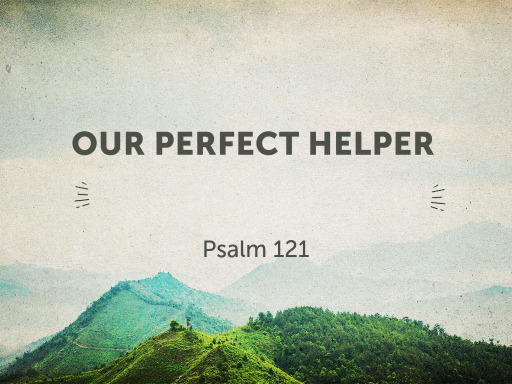Our Perfect Helper

Notes
Transcript
Handout
Sermon Tone Analysis
A
D
F
J
S
Emotion
A
C
T
Language
O
C
E
A
E
Social
Introduction
Introduction
Do you have a favorite psalm? Many of us do. The psalms connect with us on many levels and it’s easy to have one that is your favorite. Our psalm for this week is a favorite for many people.
I lift up my eyes to the mountains— where does my help come from? My help comes from the Lord, the Maker of heaven and earth. He will not let your foot slip— he who watches over you will not slumber; indeed, he who watches over Israel will neither slumber nor sleep. The Lord watches over you— the Lord is your shade at your right hand; the sun will not harm you by day, nor the moon by night. The Lord will keep you from all harm— he will watch over your life; the Lord will watch over your coming and going both now and forevermore.
1. Personal help
1. Personal help
Psalm 121:1-3a
A. Assumptions about help
1. We need help personally.
2. We look for help
not always in the right places.
mountains were where the “high places” were, idol worship
B. Acknowledgements about our Helper
1. The Lord is the helper. This term for help עֵזֶר is only used of the Lord and the wife Genesis 2:18, 20
2. The Lord is our helper “your foot”.
2. Persistent help
2. Persistent help
Psalm 121:3b-5a The Lord never stops watching over us.
A. The Lord sees everything
B. The Lord is never distracted.
3. Proximate help
3. Proximate help
Psalm 121:5b-7a The Lord is always near
A. Close at hand
Shade, relief at your right hand
What is within reach of your right hand, right now? Phone, purse, wallet, keys, Bible, coffee, the Lord.
B. At all times
Whether it is day or night, out in the open or in a dark alley
C. In times of danger
When harm is nearby
4. Perpetual help
4. Perpetual help
Psalm 121:7b-8
A. Through all your life
B. Through your travels
C. Through all eternity
Discussion questions:
1. How has God helped by keeping you from harm or hardship?
2. How has God helped you through hardship? How have you been "safe" even though you experienced harm?
3. How have you benefitted from harm or hardship?
